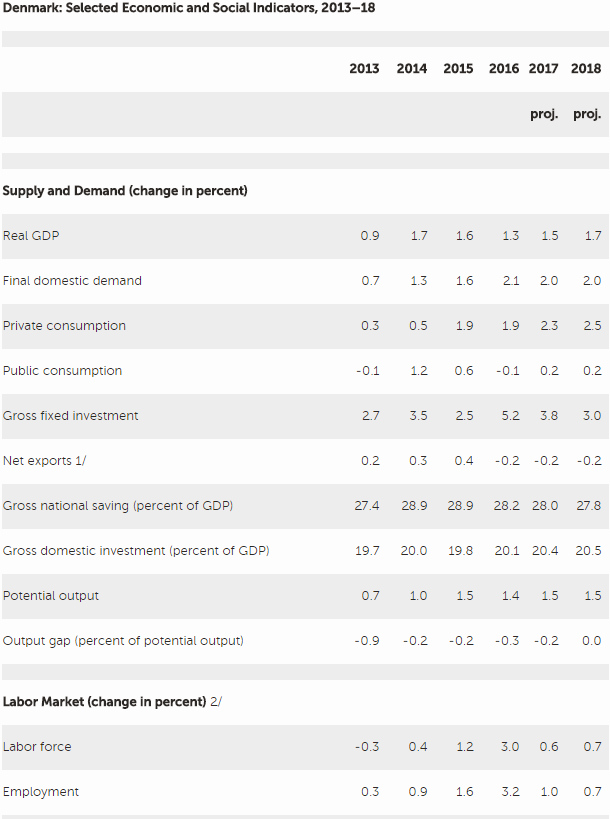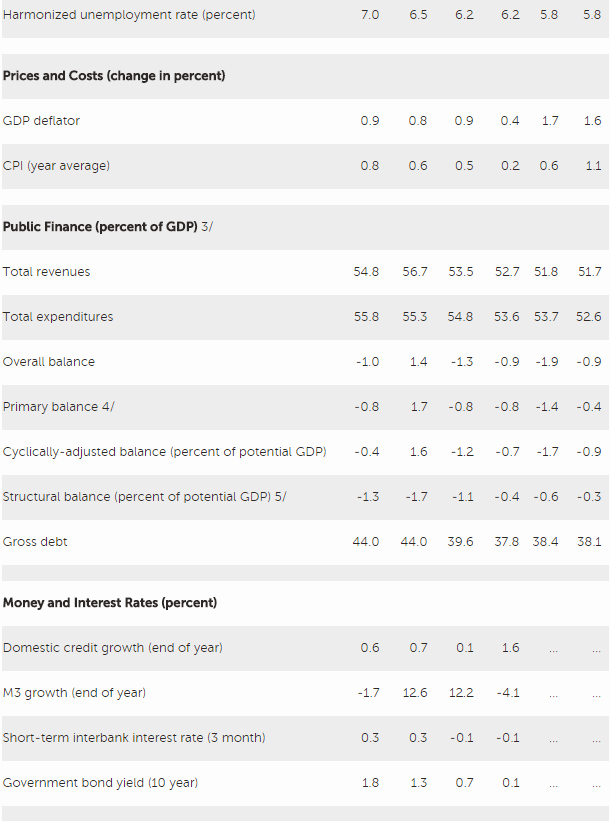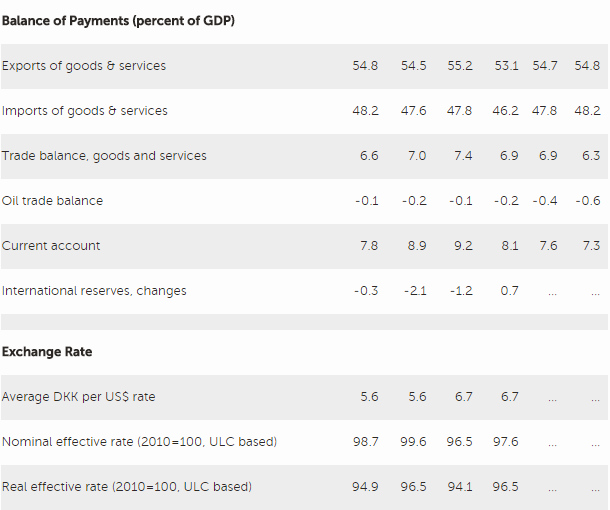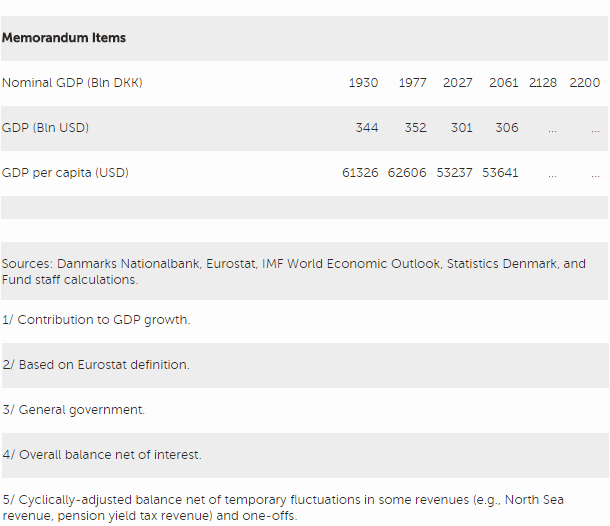IMF Executive Board Concludes 2017 Article IV Consultation with Denmark
On June 16, 2017 the Executive Board of the International Monetary Fund (IMF) concluded the Article IV consultation with Denmark.
The Danish economy has recovered and is approaching potential, even as growth in recent years has been markedly slower than before the crisis. Unemployment is low and close to its estimated structural level, and capacity constraints are gradually starting to bind in some sectors. While CPI inflation has remained subdued, house prices continue to rise fast in segments of the market. The coincidence of low output growth and increasingly binding constraints highlights Denmark’s reduced growth potential, reflecting structurally weak productivity growth and low domestic investment levels. After five years of negative interest rates, the banking system remains sound and profitable.
The outlook is for continued moderate growth, projected at 1.5 percent in 2017 and 1.7 percent in 2018. Activity is expected to be driven by strong and increasingly balanced private demand. Low interest rates and the buoyant housing market should continue to support private consumption. Investment is forecast to continue its rebound as corporates’ balance sheet repair progresses and the need to alleviate domestic capacity constraints becomes more prominent. As the economy continues to operate at a level close to capacity, inflation should gradually rise.
These forecasts are subject to substantial risks. Domestically, increasing labor shortages could undermine medium-term growth prospects, although sustained increases in labor participation could help mitigate such pressures. Continued house price rises would further increase households’ exposure to shocks, including from rising interest rates. External risks include lower-than-expected growth in the euro area and rising political and geopolitical uncertainties, which could negatively impact the Danish economy. However, greater-than-expected gains in consumer and business confidence abroad could help support growth.
Executive Board Assessment
The Executive Directors welcomed the steady momentum in the Danish economy and the strong labor market performance, but noted that growth has remained slow and output is approaching potential. They concurred that policy efforts should focus on alleviating capacity constraints, raising potential growth, and bolstering resilience to shocks.
They agreed it would be appropriate to slow the pace of fiscal consolidation somewhat to facilitate tax cuts, provided that strong new labor market reforms are also implemented to raise labor supply. They recommended shifts in the composition of fiscal outlays towards productive public investment to help raise growth potential. Directors believed that a tighter fiscal stance would be needed if growth turned out substantially stronger than expected. Directors agreed that monetary policy should focus on maintaining the peg, and continue to normalize interest rates as conditions allow.
Against the backdrop of ongoing rapid house price increases in urban areas and high household debt levels, Directors welcomed the recently agreed property tax reform to end the current procyclical valuation freezes. While also welcoming the Systemic Risk Council’s debt‑to‑income limit proposal, they considered that the limit could be broadened to cover all loans, irrespective of their terms, with tighter limits for interest‑only loans and variable rate instruments. Directors called for further policy action to contain risks from the housing market, including by introducing amortization requirements; raising the down payment requirement; further reducing mortgage interest deductibility; and easing regulations that constrain housing supply.
Directors commended the authorities for the good progress on upgrading the financial regulatory framework. They welcomed the MOUs with Nordic neighbors on systemic branches, and urged the authorities to implement them and evaluate their effectiveness after one year. Directors underscored the importance of strengthening the independence of the financial supervisor (DFSA), including by lengthening the terms of its board members.
Directors concurred that unlocking labor supply is a key challenge for Denmark. They emphasized the need to follow through on education and pension reforms to promote labor participation among young and relatively older individuals. Directors suggested eliminating unemployment benefits for new graduates to help promote faster job entry, while enhancing the integration of migrants would also help increase labor supply.
Directors called for further reforms to liberalize product markets and raise investment. They recommended the authorities introduce an incremental Allowance for Corporate Equity (ACE) to reduce the debt bias in the tax system, and to promote knowledge‑related investment through direct funding or tax credits. Directors welcomed the liberalization of the Planning Act and the new utilities strategy. They suggested further relaxing strict regulations in retail trade and some network sectors to further boost competition and productivity growth.
Directors broadly agreed that the external position is stronger than implied by fundamentals, while recognizing that this assessment is subject to important uncertainties. They noted that recommended policies to slow fiscal consolidation and raise private and public investment would help reduce the current account surplus.




Source:
- 374 reads
Human Rights
Fostering a More Humane World: The 28th Eurasian Economic Summi

Conscience, Hope, and Action: Keys to Global Peace and Sustainability

Ringing FOWPAL’s Peace Bell for the World:Nobel Peace Prize Laureates’ Visions and Actions

Protecting the World’s Cultural Diversity for a Sustainable Future

Puppet Show I International Friendship Day 2020

